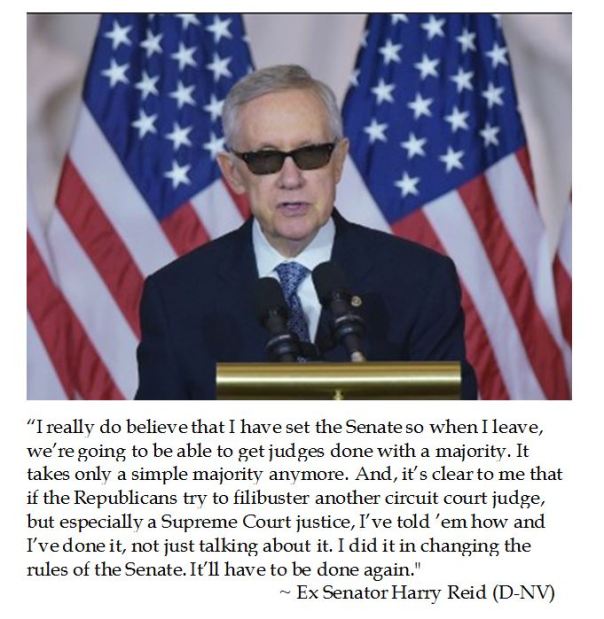A legacy of former Senate Majority Leader Harry Reid (D-NV) was the effective elimination of the confirmation filibuster.
Under the Constitution, it is the Senate's duty to confirm Executive and Judicial Branch appointments. Senate rules allowed for confirmations with mere majorities, but needed to obtain 60 votes to cut off debate (Cloture) and preclude a filibuster. The Cloture vote was intended to prevent endless obstructionism while still giving the minority some say in the proceedings of the Upper Chamber of Congress.
Needing to get enough votes for cloture was an incentive for Republicans to select more moderate appointees which required Senate consent. But such Senate niceties stopped political steamrolling by Majorities who wished to exercise their unadulterated will.
 When the Obama Administration sought to pack the Court of Appeals for DC (aka the DC Circuit), which is the court of authority for regulatory bodies, it ran into trouble when its candidates might not have received the requisite support for a Cloture Vote. So then Senate Majority Leader Harry Reid, exercised "The Nuclear Option". Exercising the Nuclear Option had been hotly debated in the preceding decade, but then Senate Majority Leader Bill Frist (R-TN) opted not to circumvent tradition.
When the Obama Administration sought to pack the Court of Appeals for DC (aka the DC Circuit), which is the court of authority for regulatory bodies, it ran into trouble when its candidates might not have received the requisite support for a Cloture Vote. So then Senate Majority Leader Harry Reid, exercised "The Nuclear Option". Exercising the Nuclear Option had been hotly debated in the preceding decade, but then Senate Majority Leader Bill Frist (R-TN) opted not to circumvent tradition.
Through Parliamentary legerdemain, Reid established a precedent in which he said that all judicial nominees, save Justices of the Supreme Court, would be considered on majority votes and did not have to pass the Cloture Vote threshold.
The Reid Rule was great when one's party is in control of the Senate and the White House. But in 2017, President Donald Trump will occupy the White House and Republicans have a two seat majority in the Senate. Incoming Senate Minority Leader Chuck Schumer thinks that he can stymie the Trump Administration through the advice and consent clause as well as any Supreme Court nominations which do not represent progressive Democrat values. However, Schumer may well rue the Reid rule legacy from Dirty Harry Reid.
Senator Ted Cruz (R-TX) and Salem Radio host Hugh Hewitt had an informative colloquy on the Reid Rule.
Republicans may not moderate their choices for positions which need to be confirmed by the Senate. Despite Harry Reid's contention that the "Reid Rule" excludes Supreme Court nominees, it is contented that avoiding Cloture for a Supreme Court nomination would simply be a second application of the Reid Rule precedent.


No comments:
Post a Comment